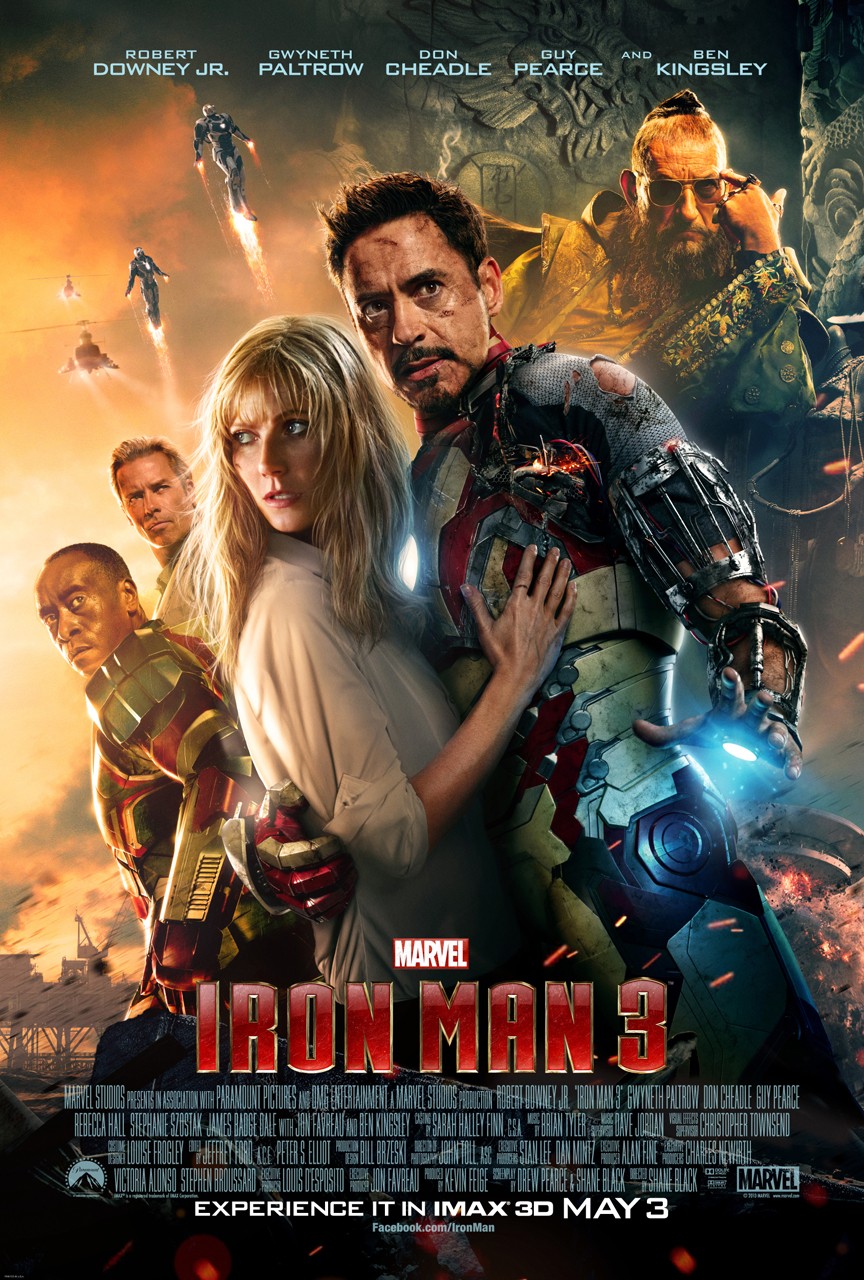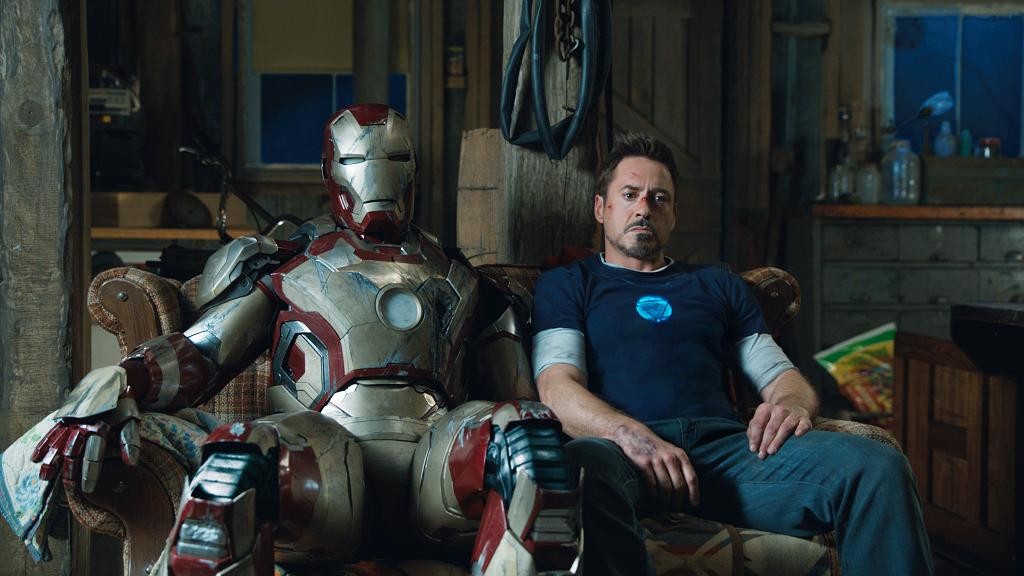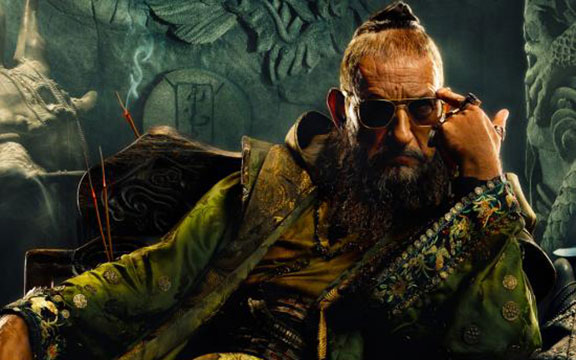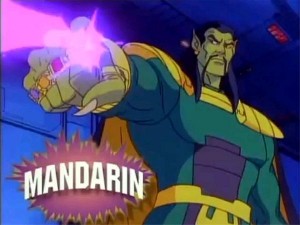Let me be quite clear about what I’m trying to do here. This is not just a review. This is not a cinematic critique, an admonishment or a chastisement of artistic mediums. Rather, it is a cry for help for a certain individual’s life choices that have spread over into said artistic mediums, becoming patently obvious through the infliction of personality defects upon an aesthetic, influencing it through temperament, chronological pacing, and the attention span that would cause a pigeon to fly into a rage of conniptions and twitches before flinging itself suicidally into a lawnmower so as to bring an end to the overwhelming presence of the aesthetic of the aforementioned individual.
I write this because I’ve just seen Iron Man 3. And I’ve become utterly convinced that Shane Black is overwhelmingly addicted to c0caine.
It seems essential to lead with the fact that I greatly enjoyed Iron Man 3. I don’t want my overwhelming concern for the well-being and imperiled sanity of Messers. Black and Downey to be the sole thing taken away from this review. (Alright, maybe it’s a review after all.) What I would prefer is that we recognize the immense achievement that they have wrought with their latest popcorn-summer offering, while becoming aware of the potentials and possibilities that are available to your typical action movie blockbusters, with which we are overly saturated every single year between the months of May and August. Iron Man 3 serves as a worthy successor to the Marvel franchise, kicking off “Phase 2” with new directions, a somewhat darker perspective, and yet further rounds of the snappiest dialogue ever to snap, crackle, and pop their way out of the Marvel universe. The resurrection of Robert Downey Jr.’s career is directly tied to his incredible personification of Tony Stark, the resident playboy of the superhero universe (or who Bruce Wayne could be if he had a sense of humor and an affinity for Wild Turkey), and it’s impossible to conceive of these films without Downey’s razor sharp mannerisms and dialogue emerging from Stark’s mouth. Downey IS Tony IS Iron Man, which is why the rumors that he might be considering leaving the franchise after the next Avengers movie is somewhat saddening and mildly terrifying. Downey is the Little Engine that Could, and the Straw that Stirs the Marvel Cocktail; without him, the entire concept seems…well…lessened.
The rest of the cast does well. Guy Pearce is credible as the villain, though the plot leans a little more James Bond-ish than anything we’ve seen out of the Iron Man movies before (a point that I’m certain every review of this movie you’ll read will mention in abject detail, and one which I won’t dignify by going into further). Gwyneth Paltrow, Don Cheadle, and Jon Favreau are given more to do here than they’ve had in the prior movies (especially Paltrow, who turns from a passive damsel in distress to an active force by the end of the film, and it’s about damn time, too), and the effects, as always, are exciting.
There are two main things that I’d like to take away from this film, however. The first is the gargantuan burst of energy and fresh creative direction that comes from injecting Shane Black into the mix. Writer of Lethal Weapon, director/writer of Kiss Kiss Bang Bang, and longtime Hollywood boy-wonder, Black’s career will enjoy a certifiable bump from the box office successes of this film. Indeed, his frenetic style matches up perfectly with Downey, much in the way that Scorsese pairs well with De Niro and DiCaprio, and if anything comes of this latest entry into the Iron Man franchise, it will be that Downey and Black continue to grind out vehicle after vehicle featuring Black’s sharply written dialogue.
To be fair and objective, many of the plot motivations of Iron Man 3 are nebulous at best. Black chooses instead to focus on characterization, dragging Tony Stark through hell and back in order to challenge him, providing a sense of continuity to the three movies and allowing for Stark to grow and adapt. It’s refreshing to see that while the movies remain connected to the larger Marvel universe, referencing the events of The Avengers, they remain true to the world created through Favreau’s first two films. The danger of this large universe that Marvel has created is that the cinematic endeavors of the individual heroes become secondary to the overarching narratives that Joss Whedon’s film created. Instead, the worlds of Captain America, Thor, and the Hulk remain solitary escapades, with minimal overlap, resulting in stand-alone films that exist for their own measure and are not necessarily beholden to the main money-maker of the studio. Thus freed of the restrictions imposed by the series Big Brother (Avengers), Black is able to explore new ideas, push ongoing dialogue, and continue the exploration of the modern military-industrial complex established (incredibly lightly, albeit) in the first movie.
Which brings me to my second takeaway from this movie.
I should point out:
SPOILER ALERT.
…
I’m not kidding:
SPOILER ALERT.
…
For complete transparancy:
MAJOR MAJOR PLOT SPOILERS AHEAD THAT WILL COMPLETELY AFFECT YOUR VIRGIN VIEWING OF IRON MAN 3.
…
Don’t say I didn’t warn you.
The marketing campaign for Iron Man 3 has centered around the threat posed by the Mandarin, the longest running villain of the Iron Man comic universe. In the comics, the Mandarin is a super villain of Chinese origin, in possession of ten rings that endow him with magical powers. He is ancient, he is an ever-present threat to Tony Stark, and he reeks of stereotyped Oriental characteristics, right down to his Fu Manchu.
In the previews, he has been shown as an Osama Bin Laden-style terrorist, speaking in cryptic overtones with an ambiguous dialect, complete with scraggly beard, Oriental cape and symbols, and ten ambiguous rings that may/may not have some types of powers that affect him in various, mysterious ways. He’s the one responsible for the destruction of Tony’s seaside Malibu home (an amazing action sequence) and seems to pose a threat to the entire world through diabolical terrorist actions.
Or so the trailers would have us believe…
During the movie, it is revealed that the Mandarin is hiding out in the Miami palace of Aldrich Killian, Guy Pearce’s scientist/villain who is busy developing the Extremis program, a form of body enhancement that results in the ability to regenerate severed limbs, cure paralysis, obtain superhuman strength, and breathe fire and generate extreme temperatures on demand. (I shit you not) When Tony and the Iron Patriot (Don Cheadle’s suited-up character, updated from War Machine) break into the estate, they discover Ben Kingley’s Mandarin to be…a drugged out actor posing as the diabolical Mandarin in exchange for pills, bimbos, and “a great big speedboat”.
And that’s where things get really interesting.
Going into this movie, I recalled the first Iron Man‘s characterization of terrorists as stereotypical brown Arabs who hang out in caves and take pleasure in, well, terrorizing small third-world villages with Stark’s weapons and technologies. Watching the previews, I was fearful that the Mandarin would be an extension of this, using the dark images of terrorism to provide a human threat for Iron Man, by far the Marvel superhero most beholden to real-world threats and problems. By making him a created terrorist (funded by white Americans), Black uses the Mandarin as a placeholder for the crimes of stereotyping that the first two movies were so incredibly guilty of. He is, as Pearce explains, a force that can be used to “control the war on terror” for Killian’s personal motivations. (What those are is never quite made clear, though I figure that gaining the ability to glow and breathe fire does have a tendency to deposit one straight onto the crazy train.) The televised infomercials for the Mandarin further elaborate this idea, playing on fears common in the first decade of the 21st century such as the blowing up of military ships, armies pouring through streets of the Middle East, and the Mandarin posing as a violent threat to first world society.
I support the idea of dis-ambiguously adapting the comics to the big screen; obviously, adapting the Mandarin as he is written in the comics would play poorly in the growing film market in China, so there’s a financial incentive. By playing him as an actor, making him a pawn used in a far greater game, Black toys with the idea of the “war on terror” as a created device used to warp and control the public. This brings about flashbacks to the origins of the War in Iraq, in which the public were force-fed notions of “WMD’s” and threats posed by similar terrorists that were, as it turned out, mostly created out of smoke and mirrors. By having the audacity to take Iron Man’s most iconic villain and making him nothing more than a shadow-puppet of an industrial war-monger, Black takes what might be a simple summer popcorn action flick and makes it into a commentary about how we receive images of terror in our lives and what it makes us think about when we see racist images of brown men running around with machine guns in the desert.
Over the past few days, I’ve had discussions with fans of the comics and movies of the Marvel universe, and have encountered both support for the liberal adaptation of the Mandarin character into something far more relevant for our modern culture and extreme disdain for the mangling and manipulation of one of the more notorious and recognizable of the Marvel villain canon into a bumbling fool controlled by a less interesting real world figure. Both viewpoints have merits. Comic book fans are notoriously fickle, protesting anything involving change to characters that they have grown up with and seen established over thousands and thousands of pages of material. However, the movies, while generally successful and true to the spirit of the comics, are independent artistic entities, free to speak with their own voices to reflect the changing nature of the world. By allowing Black to play with the Mandarin character, Marvel has opened up the franchise to a number of possibilities that would not be fully accessible were he to religiously adhere to the dogma of the comics. Iron Man 3 does not adapt from a single arc of the comics, following much of the Extremis storyline, but pulling from a number of different ideas and locations, and Black’s own voice rings true in the movie. This, in a world so heavily structured and guarded by the corporate bosses at Marvel, is no small achievement.
Having said that, and returning to my review, the only way that I can truly describe the experience that is viewing Iron Man 3 is that it is turbulent, frenetic beyond belief, and possessed with an awareness that can only be rivaled by that of a coked-out twenty-something on a binge in downtown L.A. It’s my express belief that Trevor Slattery (the actor playing the Mandarin) is Shane Black himself, giggling and laughing as he orchestrates something far bigger than himself, with a possible hint of nefarious motives running beneath his outlying appearance of buffoonery. (I should also say that the performance by Kingsley might be my favorite “villain” performance in all of the Marvel cinematic universe, rivaled only by Tom Hiddleston’s Loki.) It is my sincere hope that Black continues to work with the Iron Man franchise, playing at superheroes with Robert Downey Jr. as they gleefully laugh in the face of modern culture while entertaining us one screening at a time.
Provided somebody makes sure that Shane Black’s obvious addiction to cocaine doesn’t cripple him first.
(*I am only suggesting that Shane Black is addicted to cocaine. There is no evidence to support my claim without first investigating his own personal life, which is his own to do what he wants with. The majority of my hypothesis is based on pure conjecture, drawn from regarding the aesthetic choices of Iron Man 3. Having said that, the dude must be high off his rocker. Somebody help that poor man.*)









